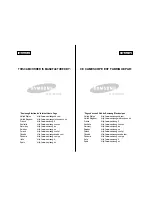
Page 22-32
BLANK
The function BLANK, with arguments #n and #m, creates a blank graphics
object of width and height specified by the values #n and #m, respectively.
This is similar to the function PDIM in the GRAPH menu.
GOR
The function GOR (Graphics OR) takes as input
grob
2
(a target GROB), a set
of coordinates, and
grob
1
, and produces the superposition of
grob
1
onto
grob
2
(or PICT) starting at the specified coordinates. The coordinates can be
specified as user-defined coordinates (x,y), or pixels {#n #m}. GOR uses the
OR function to determine the status of each pixel (i.e., on or off) in the
overlapping region between
grob
1
and
grob
2
.
GXOR
The function GXOR (Graphics XOR) performs the same operation as GOR, but
using XOR to determine the final status of pixels in the overlapping area
between graphic objects
grob
1
and
grob
2
.
Note
: In both GOR and GXOR, when
grob2
is replaced by PICT, these
functions produce no output. To see the output you need to recall PICT to the
stack by using either PICT RCL or PICTURE.
LCD
Takes a specified GROB and displays it in the calculator's display starting at
the upper left corner.
LCD
Copies the contents of the stack and menu display into a 131 x 64 pixels
GROB.
SIZE
The function SIZE, when applied to a GROB, shows the GROB’s size in the
form of two numbers. The first number, shown in stack level 2, represents the
width of the graphics object, and the second one, in stack level 1, shows its
height.











































